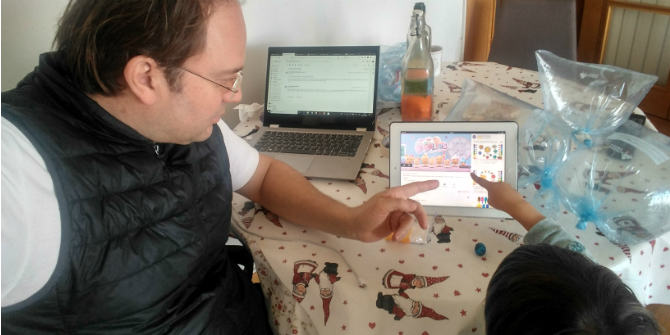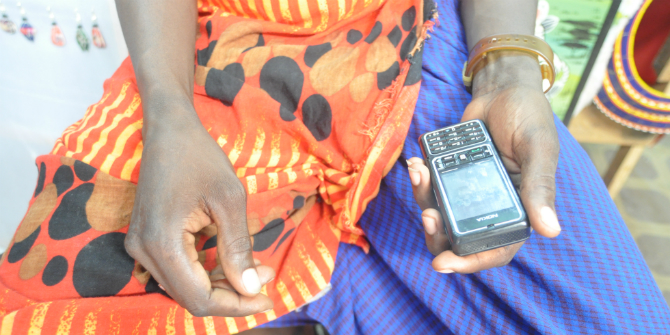What role do mobile phones play in the lives of migrant children in China? In this post, Pei Huang reports on her interviews with five children about their mobile practices, emphasising the need to take into account the children’s transition from rural to urban. Pei is an Associate Professor in School of Digital Media and Design Arts, at Beijing University of Posts and Telecommunications. She has participated several times in the serial project researching the new media usage of young people under 18 in China, examining impacts of different new media on young people’s life. [Header image credit: Author]
In China, there are many regional and situational differences as children adopt mobile technology and new media. A survey entitled Three different roles, five different aspects: Differences and similarities in viewing school mobile phone policies revealed that school students in Pearl River Zone, for example, generally reported that mobile phone use could ‘help their learning’, while their teachers and parents tended to be more negative. However, Tom McDonald’s field research in a rural town showed that everyone believes in social media’s negative impact on learning.
The significant gaps in new media adoption and usage between urban and rural areas (see 37th reports from China Internet Network Information Center) leaves a group of children caught in-between. These are migrant children (i.e. those children moving with parents from rural to urban areas). A survey carried out in 2010 by the All China Women’s Federation estimated that there were 28.8 million migrant children from rural families in China’s cities. Zhuang (2010) and Zheng (2014, 2016) reported that their media access and usage is via television and PCs, with little known about their mobile phone usage. When I had the chance to be in touch with migrant children in Beijing, I thought it necessary to carry out a preliminary study on their mobile phones usage.
As part of a project researching the new media usage of young people under 18, I was able to get in touch with a public school in Beijing, where 70% of the students are migrant children. I talked to five students in Year 4. Since many of their parents work in the service industry (which can’t guarantee a regular working schedule), the school allows students in or above grade 4 to bring mobile phones to school to keep in touch with their parents, in case of a late pick-up after school. What do these students do on their mobile phones?
Mobile phones enabling connections between city and hometown
The mobile life of migrant workers means communication between family members is difficult, so the children’s role of broker is more like a connection hub, linking city and hometown. One child said:
Usually my parents don’t have time to pick up the phone and talk because of busy work. It’s easier for relatives at home to get in touch with me. Grandparents love to talk to me because they miss us. Also, I can tell mom and dad to call back.
Another explained:
I don’t have a lot of friends to play with in Beijing. I was born and taken care of at a village in Hebei province till the age of 6. In my spare time in Beijing, I will call back and talk to some friends at hometown. It’s good to hear stories from them.
Education and information
The children I talked with used social media such as QQ and WeChat. One boy described his use of QQ:
We set up different group chats in QQ. Group of the same class without parents and classmates, groups with parents, teachers and classmates, a group of good friends [no classmates]. In a group of the same class, we often ask about homework, sometimes laughing at classmates’ profile photos; in a group of good friends, we make jokes and send something funny, like zodiacs; in a group of parents and teachers, we trace talks between teachers and parents. Some of the tips for better study seem great.
They talked about using social media for information and useful education instructions, and all said that their parents thought that their use of mobile phones had a positive impact on their schoolwork and learning.There is a trend for promoting learning through new media in China, such as that mentioned in a report from the Center for Child Rights and Corporate Social Responsibility. WeChat, with its app-within-an-app-model, means articles from different sources can easily be forwarded. In my talks with the children, they all said they could use their parents’ WeChat account to read articles related to study and education. At the same time, the parents and teachers were always looking for good educational information, which they then circulated to boost students’ enthusiasm for study.
Coping with life in the city
In this exploratory study, migrant children use mobile phones for family and educational needs, and are monitored by their parents and teachers. ‘Study hard to fight for a better future’ is still a valued idea for the migrant parents and their children, and Xiong (2010)’s research showed that migrant children aspire to ‘move up’.
In a city like Beijing, educational information flows through new media such as WeChat, providing a platform to link schools, parents and students. Despite the need for surveillance over children’s safety and family issues, mobile phones and other new applications actually provide a tool to cope with life in big cities for migrant workers and their children. For migrant children, mobile phones link them with family, school and friends and serve their communication needs. At the same time, migrant children use mobile phones to coordinate their social relationships, as well as study in city. For me, I think their ideas of home, school, family and friends are intertwined with technology use. In future studies, it is important to observe migrant children’s daily mobile phone uses in different contexts, talk with them about their feelings of mediation through mobile phones. By doing so, we can try to support them by recognizing their needs and help to build up their strengths in using mobile technology for enabling a better life.
This post gives the views of the authors and does not represent the position of the LSE Parenting for a Digital Future blog, nor of the London School of Economics and Political Science.






